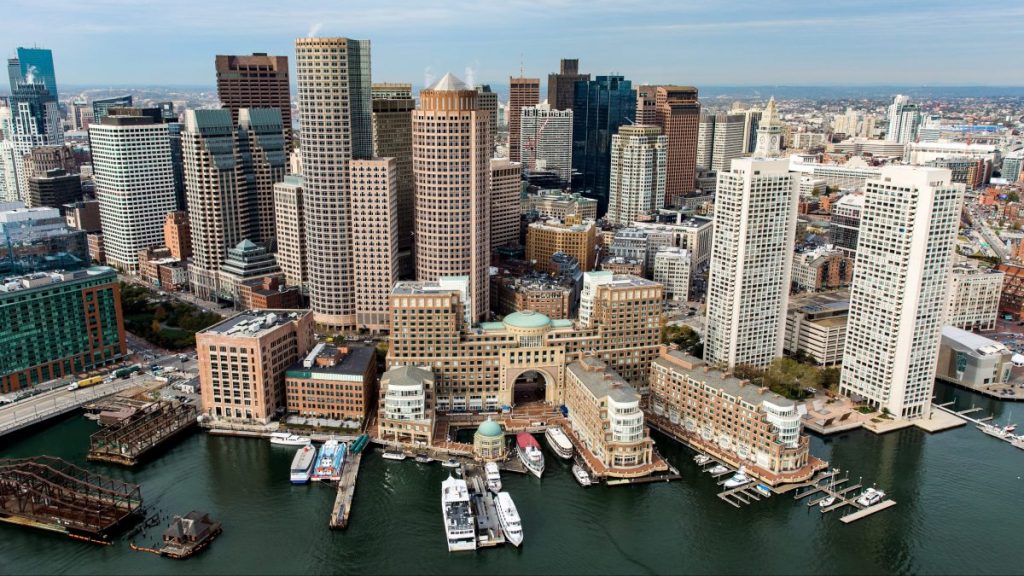Posts by Tamara Small
NAIOP Massachusetts Installs 2024 Leadership Team
(Boston, MA) – At its Annual Meeting held on November 28, NAIOP Massachusetts, The Commercial Real Estate Development Association, elected a new President and Board members. The Board includes the principals of many of the region’s leading commercial real estate firms.
Kirk Sykes, Co-Managing Director of Accordia Partners, was elected President of NAIOP Massachusetts for 2024. In this capacity, he will work closely with NAIOP staff and Chapter leadership to guide the organization. NAIOP’s 2023 President, Patrick McMahon of Federal Realty Investment Trust, will serve as the organization’s 2024 Board Chair; Doug Manz of HYM becomes President-Elect; Melissa Schrock of Hilco Redevelopment Partners will serve as Treasurer; and Patrick Sousa of Marcus Partners, the newest addition to NAIOP’s Board Management Committee, is the organization’s Secretary. Jim Tierney of JLL and Erin Corcoran of Oxford Properties will serve as advisors to the Board Management Committee.
Read MoreHealey-Driscoll Administration Releases $4 Billion Housing Bond Bill
Today NAIOP CEO Tamara Small joined business leaders, advocates, legislators, developers, and representatives from the Healey-Driscoll administration in Chelsea for the unveiling of the Administration’s $4 billion housing bond bill, The Affordable Homes Act. The legislation represents the largest proposed investment in housing in the state’s history.
Read MoreGovernor Healey Declares State of Emergency Due to Severe Lack of Shelter Availability in Massachusetts
Governor Healey declared that a state of emergency exists in Massachusetts due to rapidly rising numbers of migrant families arriving in the Commonwealth in need of shelter and services – and a severe lack of shelter capacity in the state. The state of emergency will allow the Administration to advocate for federal support to address the need for expanded shelter access and other services.
There are several ways for individuals and companies to support families seeking safety and shelter in Massachusetts right now.
Read MoreWhat’s the Forecast for Commercial Real Estate?
Since the beginning of 2020, fear of a recession has kept economists and policymakers up at night. But even now, despite high interest rates, consumer spending is up, and many are asking – is this the recession we planned for? At a recent mid-year economic overview hosted by NAIOP Massachusetts, the experts dug into the data.
Read MoreHow to Protect our Economic Growth and Fight for our Climate Future
Climate change is an economic development, public health and environmental issue that affects every resident and business in the commonwealth. Bold action must be taken, along with critical short-term strategies that effectively balance our continued economic growth with our long-term decarbonization and environmental goals. Only this approach will ensure that Massachusetts is put on a responsible, achievable path to mitigate and manage the devastating effects of climate change.
Read MoreWHAT’S AHEAD IN 2023?
This excerpt was written by NAIOP CEO Tamara Small was originally published in the Boston Business Journal on January 27, 2023.
The year 2023 is expected to be a bumpy one for commercial real estate. The Financial Stability Oversight Council‘s Annual Report recently listed commercial real estate as one of its top market and credit concerns due to rising interest rates, borrowing costs, and uncertain economic conditions. In the Greater Boston market, the “flight to quality” trend where tenants are opting for new, highly amenitized Class A space will continue this year — particularly for lab and office tenants. Sublease space and vacancy rates, already at the highest point in 20 years in Boston, will continue to climb in both the downtown and suburbs.
Read MoreStrategies for a Strong and Resilient Massachusetts
With a new gubernatorial administration comes new opportunities to shape the future of Massachusetts. As we look ahead to 2023, there is little doubt that it will be a difficult year for businesses. The incoming Healey-Driscoll administration must be a partner with the business community to ensure that safeguards are in place so the commonwealth can weather the economic storm. Only together can we work to secure the livelihoods and futures of Massachusetts’ residents and businesses.
Read MoreRent Control Is Not the Answer to Our Housing Crisis
Rent Control Is Not the Answer to Our Housing Crisis Decades of Research Shows Its Harm By Tamara Small | This column originally appeared in Banker & Tradesman on September 11, 2022 In July, yet another report was issued highlighting the housing crisis in Massachusetts. The Housing Underproduction Report examined markets throughout the country and…
Read MoreFossil Fuel Bans Are Not the Solution to Our Climate Crisis
The news is dire. On an almost daily basis, new reports are issued which illustrate the need for immediate action to address a monumental threat to public health and safety, the environment and economic development: climate change. Sea level rise, increased storms and precipitation and rising temperatures will affect all residents and business owners in Massachusetts. The time to act is now.
Read MoreTransfer Taxes Tempt, But Would Only Worsen Housing Crisis: City Budget Threatened if New Investment Discouraged
By Tamara Small | This post originally appeared in Banker & Tradesman on April 3, 2022 The shortage of affordable and workforce housing is currently one of the greatest threats to the Massachusetts economy. With rents and home prices continuing to increase, we see more and more of the workforce priced out of the market…
Read More









